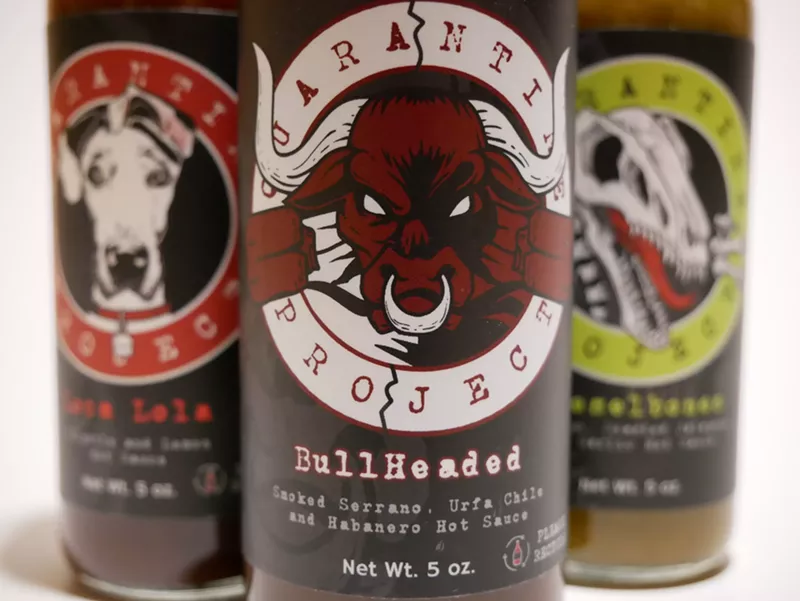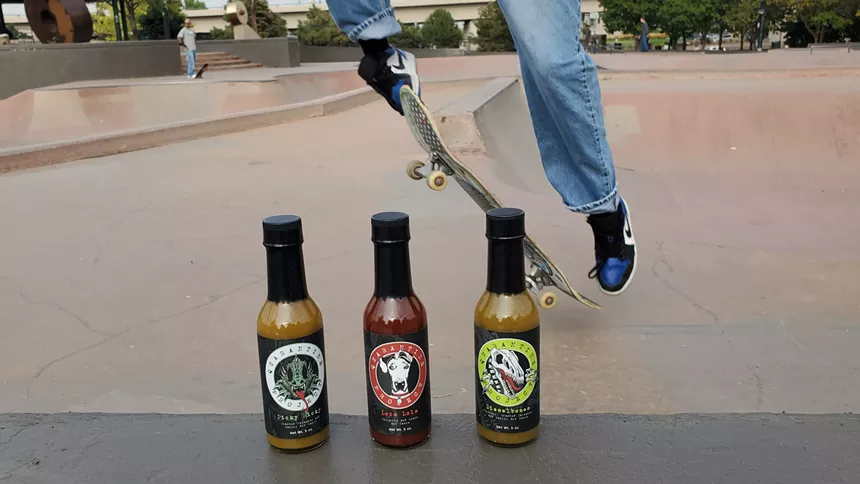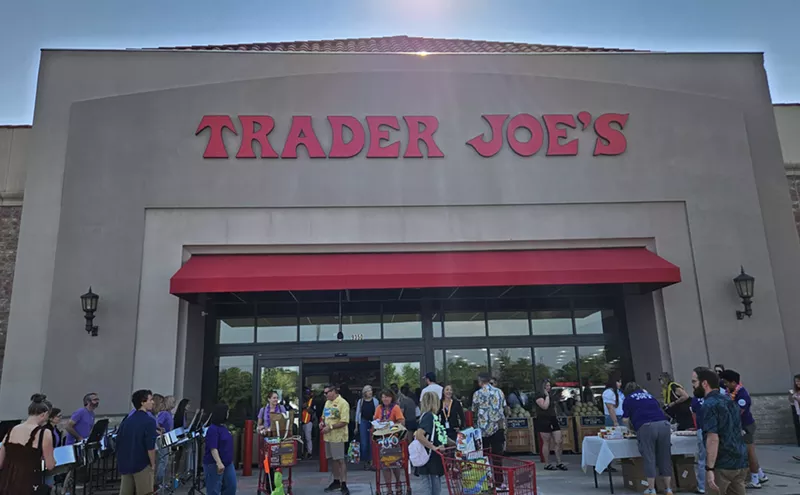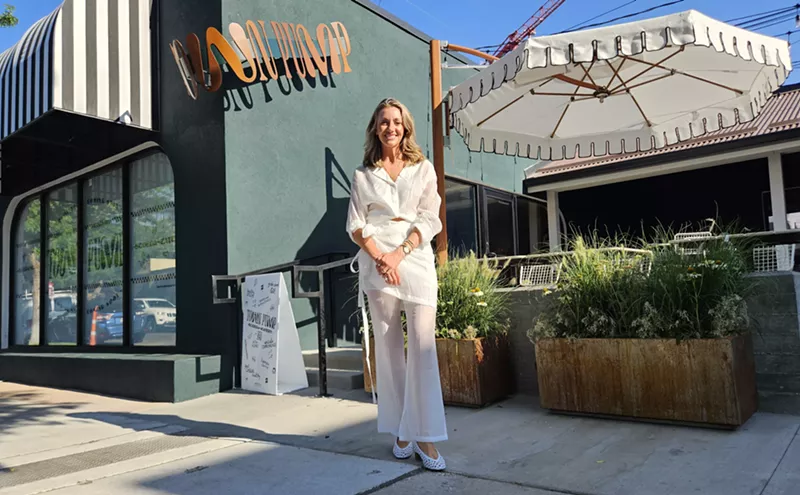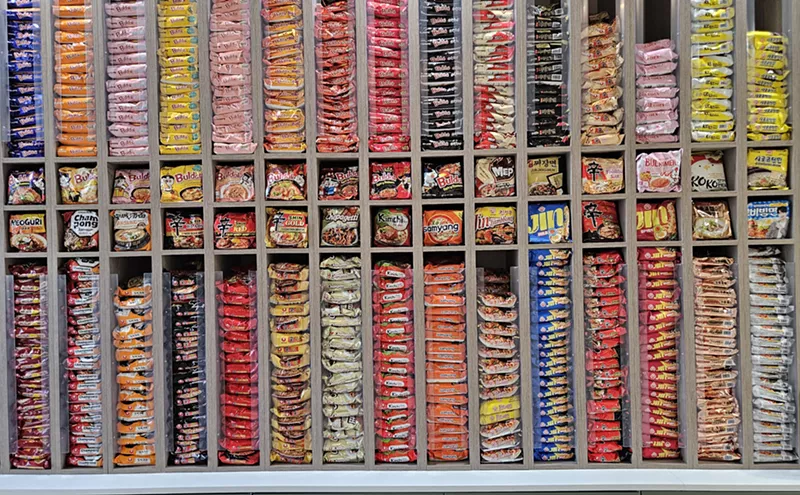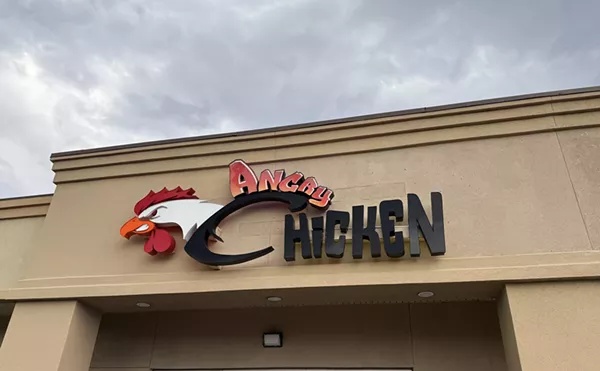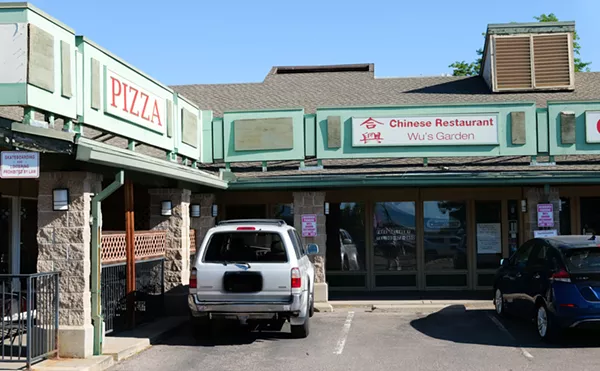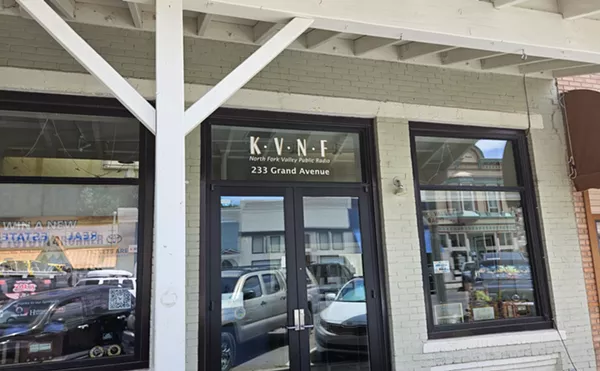One day in late 2020, furloughed from his job and spending too much time at home, Rick DeSimone was in search of snacks to accompany a Netflix binge. He unearthed a forgotten do-it-yourself hot sauce kit and soon had six bottles of a thick, aromatic green sauce.
Next up was a smoky chipotle and lemon sauce. Both concoctions were big hits with his friends, and DeSimone realized he had whipped up something more than a pandemic-era hobby. It had all the makings of a distinctly different hot-sauce company, one with a product line that didn’t rely on Scoville units or mouth-searing pain to draw customers.
Before his hot sauce odyssey, the Englewood native had a 20-year career as an optician, as well as a stint in stand-up comedy. Now he’s the founder and prime mover of the Quarantine Project, a Denver-based company that is finding its way to area restaurants and specialty shops.
Doing standup helped DeSimone develop the sense of humor he’s needed to launch his company and navigate a daunting procession of spreadsheets, food regulations, and funding challenges. “My partner Dan Steiner and I agreed that if we got $5000 through Kickstarter, we’d start the company,” he says. The goal was met (the fundraising video was both compelling and hilarious), and the pair soon ramped up production.
Although the simplicity of the product makes it a relatively inexpensive start-up, getting QP’s sauces onto retail shelves has been an arduous process. “You start at farmer’s markets and then you move to small retail,” DeSimone explains. “Eventually, everyone wants to jump to big grocery store chains, but unfortunately, that means that you need to be able to give away about six months’ worth of free product. For a small brand, that’s very tough,” says DeSimone. (Large chains only buy from distributors, and small companies must prove that their product will sell.)
DeSimone and his partner also learned that Amazon was not the answer. After being featured on an episode of “Money Court,” a TV series where small business partners clash over financial matters (in this case the dispute was exaggerated for effect), DeSimone assumed that Amazon would be the first place the TV audience would go to make a purchase. Sales were disappointing and there was a $4.00 fee for every bottle sold, as well as a cost to warehouse the product. DeSimone says that consumers are very particular about their hot sauces, and there is a huge selection on Amazon. “It was like selling water to the ocean.”
Yet DeSimone was able to develop a niche for his sauces, which stand in contrast to the super-hot brands that are trying to cash in on the success of the “Hot Ones” interview show, as well as the more trendy, exotic brands that are, in DeSimone’s view, “trying to be creative by adding green apple or star anise.” Too many brands, he adds, use too much vinegar, which smothers other flavorings.
“I try to be very pepper-forward,” he says. “With Picky Ricky, the first thing you taste is the jalapenos. Mine are for the home chef, not the hot sauce fanatic.”
DeSimone creates his sauces to enhance a certain type of food, and all of them are savory, which makes them more versatile than those containing anything sweet. Son of A sauce (the hottest among the six) was created after DeSimone went to his spice cupboard and started experimenting, finally settling on rosemary paired with habanero. “Rosemary turned out to be such a bright complement, and I realized how well it would go with roasted chicken, beef stew or poutine.”
The mildest is Tot Sauce, which was added to the lineup a couple of years ago because DeSimone thought it would be fun to offer a very mild but flavorful sauce for kids and heat-sensitive adults. “Most of the products targeted towards kids are either bland or sugary. While kids don't like spicy, they do like flavorful food,” he notes.
The other four sauces are in the medium range for heat. Bullheaded, which goes well with meats or as a marinade, is a complex smoked serrano and urfa sauce, with a touch of habanero. DeSimone also recommends it for vegetables.
Picky Ricky, the original sauce, has roasted jalapenos, roasted garlic and toasted onion, making it versatile and especially good on creamy dishes. Dieselbones is tangy, with notes of roasted jalapenos, cayenne, and a double dose of garlic, making it a good choice on pizza, pasta or anything that needs more garlic. Mild Loca Lola is mostly chipotle and lemon, but also has guajillo, arbol, and New Mexico chiles as well as roasted garlic and toasted onion. It goes well with breakfast dishes, chicken wings, barbeque, or Loca Lola Avocado Toast. All of his spices come from Savory Spice. “They have such a huge selection, sometimes I just go in and try new things,” he says.
DeSimone learned the basics from his hot sauce kit booklet; you start with around 25% vinegar or lemon juice or a combination of the two to reach a pH level below 4.0, which is necessary for shelf stability. But it’s DeSimone’s patient experimenting with bold but simple flavors that has drawn customers.
The sauces are made at a commercial kitchen in Longmont in 50 to 100 gallon drums; first comes the vinegar or lemon juice, then the flavors and peppers are added and blended with a large immersion blender. Next, the bottles are filled with an extruder piston filler and await their labels, designed by Kyle Bufkin, a friend of DeSimone’s. “I love his aesthetic, and wanted to support an artist,” he explains.
The product is then shipped to DeSimone, at the Saltbox, a shared workspace and warehouse in North Park Hill that houses other entrepreneurs and is home to a branch of the Denver Economic Development Corporation.
Currently, QP sauce is served at several area restaurants, including the Rally Hotel, Fox and the Hen, and Smokin’ Yards. It’s available throughout Colorado at many retailers, including the Artisan Center, Leevers Locavore, and Matchbox Candle Co. It can also be purchased from the Quarantine Project website, which features numerous recipes and videos; check out DeSimone pitching as his alter-ego Dieselbones, complete with homemade hot sauce bottle costume, or stealthily ditching a restaurant’s hot sauce and replacing it with his own product.
Although DeSimone downplays this aspect of his business, a percentage of his sales goes to various nonprofits. All of the chosen nonprofits are personal; for example, proceeds from Loca Lola sauce (named after his late harlequin great dane) go to Big Dogs, Huge Paws, and the Bug Theater benefits from sales of Dieselbones sauce, named after DeSimone’s stand-up comedy nickname.
DeSimone also serves on the board of Naturally Colorado, which brings together investors, brands, retailers and industry experts to help Colorado entrepreneurs establish markets for natural products companies. The organization will participate in a national spring expo next year called “Local Spark” in the McNichols Building, which hopes to showcase around 50 brands and 60-70 retailers.
“Naturally Colorado is big on helping small businesses,” DeSimone says, “and we think this will be huge for a lot of these companies.”
Quarantine Project's hot sauces are available online or you can find a list of shops and restaurant on their website: quarantineprojectsauce.com.

Audio By Carbonatix
[
{
"name": "GPT - Billboard - Slot Inline - Content - Labeled - No Desktop",
"component": "23668565",
"insertPoint": "2",
"requiredCountToDisplay": "2"
},{
"name": "STN Player - Float - Mobile Only ",
"component": "23853568",
"insertPoint": "2",
"requiredCountToDisplay": "2"
},{
"name": "Editor Picks",
"component": "17242653",
"insertPoint": "4",
"requiredCountToDisplay": "1"
},{
"name": "Inline Links",
"component": "18838239",
"insertPoint": "8th",
"startingPoint": 8,
"requiredCountToDisplay": "7",
"maxInsertions": 25
},{
"name": "GPT - 2x Rectangles Desktop, Tower on Mobile - Labeled",
"component": "24956856",
"insertPoint": "8th",
"startingPoint": 8,
"requiredCountToDisplay": "7",
"maxInsertions": 25
},{
"name": "Inline Links",
"component": "18838239",
"insertPoint": "8th",
"startingPoint": 12,
"requiredCountToDisplay": "11",
"maxInsertions": 25
},{
"name": "GPT - Leaderboard to Tower - Slot Auto-select - Labeled",
"component": "17676724",
"insertPoint": "8th",
"startingPoint": 12,
"requiredCountToDisplay": "11",
"maxInsertions": 25
}
]

